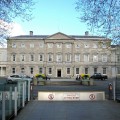
Remaining Structural Reforms Under the EU/IMF Programme
18 Sep 2013Key Point
This note looks at the structural reforms required by the Troika as the current EU/IMF Programme draws to a close. Key reforms in health, state assets, the labour market and water services are discussed.
Introduction
There is less than four months left under the current EU/IMF Programme, with 91% of available funding having already been drawn down. While Irish fiscal policy will be constrained for the foreseeable future under debt and deficit targets as laid down by the Fiscal Compact, the period under which the troika can direct the government on specific areas of policy is drawing to a close. In the tenth review of the EU/IMF Programme the troika outlined a number of structural reforms to be undertaken by the Irish authorities.. The report considers a number of specific areas for structural reform including health, the sale of state assets, the labour market, and water services.
Health Spending
In terms of the health sector, the troika have expressed concern over our costly health sector. In particular, the Troika have required that the authorities conduct a study to compare the costs of drugs, prescription practices and the usage of generics in Ireland with comparable EU jurisdictions with a view towards lowering the costs borne by the state.
The Irish authorities will also develop an eHealth Strategy in conjunction with the Health Service Executive by the end of Q2 2013. According to the troika, this will serve as a time-bound action plan for the implementation of eHealth systems, including a comprehensive system of ePrescription which uses a unique patient identifier, such as the PPS number “to support and enable the delivery of integrated patient care under the reform agenda.”
State Assets
The state assets structural reforms agreed with the troika require that the Irish authorities provide a detailed report of the asset sales currently undertaken to date. In relation to state assets identified for sale but are yet to be sold, the Irish authorities will report on progress made and outline any remaining steps. As previously agreed, at least half of the proceeds from the disposal of state assets are to eventually go towards debt reduction, with the Irish Government having discretion over what to do with the remaining proceeds, be it investment in capital infrastructure or other job creation measures, etc.
Labour Market
Officials from the troika have highlighted the importance of labour activation measures and reforms to ensure further progress is made on reducing unemployment generally and long-term unemployment in particular. The standardized unemployment rate fell by 0.1% to 13.6% in June 2013 from 13.7% in May 2013. The peak in the unemployment rate was 15.1% in February 2012.
According to the CSO, on a seasonally adjusted basis the Live Register total recorded a monthly decrease of 3,200 in July 2013, reducing the seasonally adjusted total to 419,200. Long-term unemployment now represents 44.7% of total unemployment, having fallen to 197,571 from 200,086 a year earlier.
Conditionality requires that the Irish authorities report on the impact of labour market reforms currently being pursued and the impact on the labour market of reforms to sectoral wage-setting mechanisms. The troika have also required the Irish authorities to communicate a timetable for the process of procuring activation services for the long-term unemployed from private providers.
Under the guidance of members of the troika, the Irish authorities will continue to redeploy and train staff from within the Department of Social Protection in order to significantly increase the number of Intreo Case Managers, with the aim of substantially increasing the number of group and one-to-one engagements with the long-term unemployed. The Department of Social Protection will report on progress towards the objectives of doubling the number of Case Managers by year end 2013 and assessing the skills adequacy of Case Managers to ensure adequate training.
Water Services
The 10th Review states that the Commission for Energy Regulation (CER) will carry out consultations to determine the framework for household water charges with a view to start charging by the end of the EU-IMF programme period. However, this deadline was subsequently extended so as to allow further time for water meters to be installed (read Frank Convery on the case for delaying Water Charges). The CER is also required to establish the framework to assess water charges for households, including those without meters. Irish Water, in association with the authorities and the CER, will inform on the level of water charges and launch a communication campaign building on the one initiated in February 2013. The CER will also conduct consultations in due course to determine the pricing methodology for the non-domestic sector.
Another water sector reform agreed with the troika is that the Government will publish the General Scheme of Water Services Bill with the aim of defining the regulatory framework for the water sector under a national public utility setting and providing for the establishment of Irish Water in its final form. There will be prior engagement with the European Commission as appropriate, in developing the legislative arrangements.





